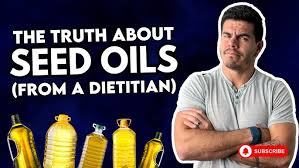What’s Really in Your Frying Pan?
In kitchens across the U.S., U.K., Canada, Australia, Germany, and Sweden, seed oils like canola, sunflower, soybean, and corn oil are pantry staples. They’re cheap, widely available, and marketed as “heart-healthy.” But in recent years, social media health gurus, nutritionists, and researchers have reignited the debate: Are seed oils harming your body from the inside out—or helping it thrive?
Welcome to the seed oil controversy—a silent war being fought in your skillet.
What Are Seed Oils?
Seed oils are vegetable oils extracted from the seeds of plants using mechanical pressing or chemical solvents. Common seed oils include:
-
Canola oil (rapeseed)
-
Sunflower oil
-
Soybean oil
-
Corn oil
-
Grapeseed oil
-
Cottonseed oil
These oils are rich in polyunsaturated fatty acids (PUFAs), especially omega-6 fats, which play a crucial role in metabolism—but may be dangerous in excess.
The “Silent Killer” Argument: Why Critics Say Seed Oils Are Toxic
Health influencers and certain doctors argue that seed oils are
Highly Processed
-
Often extracted using hexane, a chemical solvent, then refined, bleached, and deodorized.
-
This process may lead to the formation of trans fats and oxidized lipids, which are linked to inflammation and cellular damage.
Promoters of Chronic Inflammation
-
High omega-6 intake (especially linoleic acid) disrupts the omega-3 to omega-6 balance, contributing to chronic diseases like:
-
Heart disease
-
Cancer
-
Obesity
-
Autoimmune conditions
-
Potentially Damaging to Your DNA
-
Some lab studies show oxidized seed oil byproducts can damage cell membranes and potentially accelerate aging or neurological decline.
The Heart-Health Hero Side: What Medical Experts Say
Despite growing skepticism, many respected institutions (including the American Heart Association and the UK’s NHS) continue to recommend seed oils over animal fats. Here’s why:
💪 Cholesterol-Lowering Power
-
Seed oils are low in saturated fat and help lower LDL (bad) cholesterol when replacing butter or lard.
🫀 Backed by Clinical Studies
-
Numerous human studies show replacing saturated fats with PUFAs lowers cardiovascular risk.
-
A large meta-analysis published in Circulation (AHA journal) supports seed oil use for heart health.
🧂 Versatile and Neutral
-
Seed oils have high smoke points, making them suitable for grilling, baking, and frying without burning or breaking down easily.
ALSO READ>> 10 Everyday Foods That Are Secretly Ruining Your Health (And What to Eat Instead)
Hidden Truth: Is the Science Settled?
No. Here’s what both sides agree on:
-
Excess omega-6 without omega-3 balance is problematic
-
Highly processed oils are worse than cold-pressed or expeller-pressed
-
Trans fats and re-heated oils are universally harmful
-
Your total diet matters more than any single oil
The Alternatives: What Are Healthier Oil Choices?
Here’s how seed oils compare to other popular cooking oils:
| Oil Type | Smoke Point | Omega-6:Omega-3 Ratio | Health Notes |
|---|---|---|---|
| Olive oil | 375°F | 13:1 | Anti-inflammatory, heart-healthy |
| Avocado oil | 520°F | 13:1 | High monounsaturated fats |
| Coconut oil | 350°F | Minimal | High in saturated fat, controversial |
| Butter | 300°F | Balanced | High in saturated fat |
| Canola oil | 400°F | 2:1 | Processed, moderate omega balance |
✅ Best for Heart Health: Olive oil, avocado oil
🚫 Use with Caution: Reused seed oil, heavily refined blends
TRENDING NOW >> 5 High-Protein Breakfast Ideas for Busy Mornings
Why Ultra-Processed Foods Are Quietly Ruining Your Health in the U.S. and UK
🌎 Global Reaction: A Food Fight with Borders
🇺🇸 United States: Seed oil backlash is strong on TikTok and wellness podcasts. “Seed oil-free” restaurants are trending in L.A. and Austin.
🇬🇧 United Kingdom: NHS still supports vegetable oils, but consumers are shifting toward Mediterranean-style fats.
🇨🇦 Canada: Confusion reigns—many Canadians are unknowingly consuming seed oils in processed foods.
🇦🇺 Australia: A growing number of wellness influencers are warning against seed oils.
🇩🇪 Germany: Organic, cold-pressed oils are preferred; canola (rapeseed) oil is common but scrutinized.
🇸🇪 Sweden: Public trust in scientific advice is strong—no major backlash yet, but cold-pressed oils are rising in demand.
Final Verdict: What Should You Do?
You don’t have to toss your sunflower oil tonight. But you should be aware of:
-
The type of oil you use (cold-pressed vs refined)
-
How often you cook with it
-
How balanced your omega intake is
Moderation is key. Consider rotating oils, increasing omega-3s, and avoiding reheated or ultra-processed oils when possible.
LOOKING FOR A JOB ?
NEXT TOPIC TO DISCUSS:
-
“are seed oils bad?”
-
“healthy oils for cooking”
-
“omega 6 vs omega 3”
-
“best oil for frying”
-
“seed oil inflammation”
-
“vegetable oil alternatives”
-
“cooking oil heart health”
📢 Tell Us: What’s in Your Kitchen?
Do you still use seed oils? Have you made the switch to olive, avocado, or coconut oil? Join the conversation in the comments!






